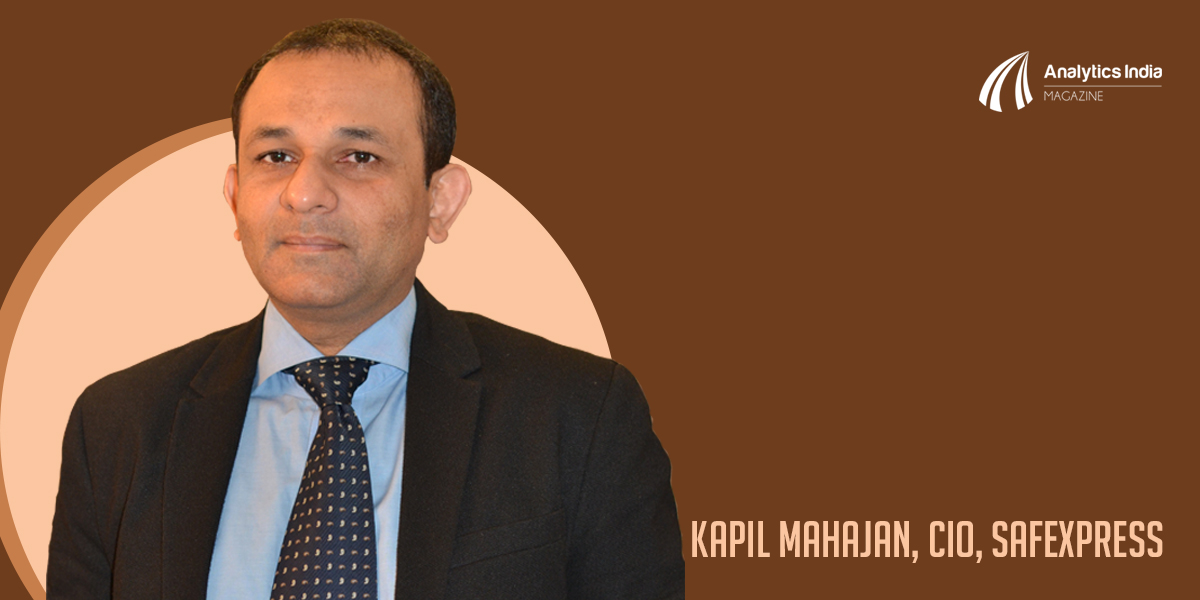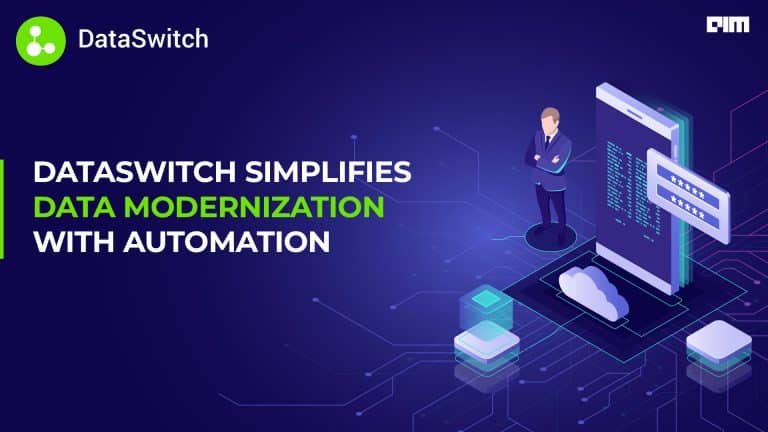Safexpress, which primarily focuses on B2B logistics, recently set up a Technology Innovation Lab to do research on emerging tech. Innovation plays an important role in Safexpress’ business operations, as new technologies help them stay ahead of the curve. They are the only Indian logistics company in India who have a functional disaster recovery centre with an active business continuity planning strategy with 100 percent barcoding for all the packets moved through our network.
Safexpress CIO Kapil Mahajan, who was an early adopter of CAMSS (cloud, analytics, mobile, social and security), interacted with Analytics India Magazine. He talked about what Industry 4.0 means for the logistics industry and how the company is leveraging the internet of things, data analytics and cloud platforms to drive their business growth.
Analytics India Magazine: What are the growth trends in the Indian logistics industry? How is technology changing it?
Kapil Mahajan: The logistics industry in India is likely to grow at a rate of 9-10 percent over the medium-term, supported by underlying structural positives, per ICRA. The report further states that, with an attempt to improve integrated logistics, the Government is planning to develop about 35 strategically-located multimodal logistic parks (MMLPs), close to major manufacturing and consumption centres. Such initiatives are bound to provide a great fillip to our industry.
Technology has become inseparable to almost all industries today, so much so that every company is becoming a technology company in some form or shape. Though a few other industries like banking and retail have been ahead of the curve in terms of new technology adoption, there’s a fast-growing appetite in the logistics industry to take advantage of modern technologies for better customer service and improved process efficiencies.
AIM: What are the latest trends in the logistics industry? How do you compare Indian logistics companies to their global peers?
KM: In the digital economy, speed is of utmost importance, more so in the logistics industry. It’s fair to say the logistics sector is the backbone of industries such as e-commerce, retail, hospitality, FMCG, manufacturing, healthcare, amongst others. Modern technologies such as cloud, artificial intelligence and machine learning, enable logistics businesses to fast-track innovation and enhance business efficiencies. With increased automation, logistics companies can further optimise service levels, while also reducing costs. We at Safexpress have recently set up a Technology Innovation Lab to do POCs on emerging technologies and work on real use cases that can add immense value to our business. Some of the AI and ML use cases that we are working on are probably the first across the globe in the logistics space.
AIM: Please highlight a few business benefits of how analytics at large has improved the overall efficiency of Safexpress?
KM: Analytics is one of the key pillars to keep our data up-to-date. For example, we leveraged IoT and analytics to speed up delivery operations. Last year, we rolled out 100 percent barcoding, so all shipments are scanned through the entire journey – right from the pick-up location to the final destination. The process of loading and unloading is recorded on scanners, and the data is communicated in real time. We wanted to ensure that no material lies in any of our hubs for more than 24 hours. Earlier, we used to do manual auditing without the benefit of real-time information. To overcome this challenge, we created an in-house digital platform for handheld devices, called HOG (Hub On the Go).
Inputs from our IoT platform, which is a mix of online scanners and GPS inputs from our fleet of over 4,000 vehicles are merged into a visual dashboard for our operations team. This solution raises a red flag if any item is lying in the wrong aisle and immediately sends an alert indicating the item’s actual destination. With this dashboard, we’re also able to determine how many vehicles are about to arrive in any given timeframe, vehicle load status and capacity, packages to be collected, and info on how best they fit into the vehicle.
AIM: What does Industry 4.0 mean for the future of logistics? How will it impact the logistics industry?
KM: Industry 4.0 will necessitate Logistics 4.0 — a strong, digital supply chain will become a prerequisite for the logistics industry. This doesn’t mean that human intervention will be eliminated, it just means people will be freed from managing mundane stuff and can add more strategic value to the business. Technologies like blockchain and IoT will make the industry more effective and customer-friendly.
AIM: Tell us more about Safexpress’ focus on technology.
KM: Technology plays the most important role in our business operations, helping us stay ahead of the curve. In terms of connectivity, we have the biggest reach in India. We’re also the only Indian logistics company in India that has a functional disaster recovery centre with active BCP strategy with 100 percent barcoding for all the packets moved through our network. This is backed by another industry first with respect to the IT infrastructure backbone based on SD WAN through our strategic tie-up with Cisco and their cloud-based Miraki enterprise networks.
Our digital strategy is based on five pillars of CAMSS (cloud, analytics, mobile, social, security) to help us take advantage of modern technologies for business growth. We’ve created a roadmap for each of these five pillars and are moving our existing technology stack to align with this roadmap.
AIM: What are Safexpress’ plans for cloud platform?
KM: Cloud technologies have been a key driver for our success. We wanted to move away from several administrative processes, bring transparency, place more emphasis on agility in terms of faster technology solutions that will help our core business, which in turn will eventually bring value to our customers and help us stay ahead of the competition. We have a lot of our systems already running on multiple cloud platforms. One of our group companies, Safeducate, became the first company in the logistics and SCM skilling space to be running 100 percent of its IT systems including the enterprise resource planning (ERP) on the cloud this year.
AIM: In your opinion, what are the benefits of using Oracle Management Cloud?
KM: At a higher level, Oracle’s enterprise-grade cloud platform solutions have helped us fast-track innovation, increase operational efficiencies and improve overall IT management. Oracle technology help us power our business growth, making the entire journey smoother.
With the Oracle Management Cloud solution, we now have end-to-end visibility for applications. It enables us with effective monitoring across silos and on all types of systems, applications, and services. We’ve realised increased IT stability, avoided outages, and the agility to adapt to ongoing change. We’ve been able to ensure that key applications are delivering consistent service levels. We’re also able to identify potential problems before users experience issues. We’ve been able to do all this while dramatically improving the efficiency of IT resources.
AIM: You are also using SaaS applications from Oracle. What benefits of Oracle Fusion Financials Cloud?
KM: Oracle Fusion financials was part of our long-term plan to cut down on time spent on administrative activities. It allowed us to have that flexibility as well as stability in the system. It has taken away the administrative task of managing and upgrading the ERP with newer builds and software upgrade patches. We had a strategic vision to move to cloud ERP for flexibility, stability and agility. Oracle cloud-based Fusion financials has enabled us to achieve exactly that, by allowing us to concentrate on our core platform and developing technology business enablers by taking away the time and effort required to manage software upgrades and associated infrastructure. We were the first across the industry to implement Oracle’s GST compliant Fusion financials in India.




















































































